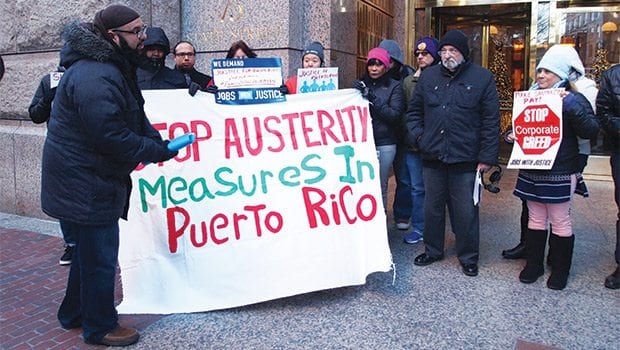
Local activists gathered outside Santander’s State Street bank branch in downtown Boston last week to decry the company’s role in Puerto Rico’s debt crisis. During the demonstration, organized by Massachusetts Jobs with Justice, protestors charged that executives from Santander — a Boston-based bank with a significant dealings in Puerto Rico —not only profiteered off the island’s financial turmoil, but also used government positions to push policies that exacerbated it. Worst of all, two of its executives are among the handful of powerful board members granted authority over fixing the crisis.
As Puerto Rico’s finances soured and loans began to look difficult to repay, the government issued more bonds to pay off interest on their debts and maintain their credit rating, and then issued bonds to pay off interest on those bonds. Meanwhile, banks like Santander earned high profits for their underwriting services on such bonds, pulling more cash from the depleting public coffers. Demonstrators say it was unethical to pursue such profit at the expense of a distressed government and that a conflict of interest was inherent due to members of government’s previous bank executive roles.
For local activists, protesting profit-hungry financiers are nothing new: this fall, they marched outside the headquarters of financial services firm USB for just such practices. But what sets Santander apart — say activists and a new report from Hedge Clippers, a group dedicated to exposing the influence of hedge funds in politics and government — is that for years, high-level members of Santander have moved in and out of powerful positions in Puerto Rico’s Government Development Bank. There they shaped economic policy in ways that favored issuing more bonds — and thus bringing more service fees to Santander and its peers. The policy behind such economic maneuvers was shaky, according to a report released from Hedge Clippers last Thursday in collaboration with Committee for Better Banks.
“Santander advised, structured and arranged much of this debt that linked investors eager for tax-free profits with desperate governments that were facing ruin,” states the report. “Much of this debt relied on controversial financial engineering, and was underwritten when the bank had conflicted relationships with the government.”
From the reports’ analysis, it appears Santander and other banks earned about $1 billion in brokering and underwriting fees on 90 debt deals. The debt issued in these deals — $61.2 billion — comprise about 87 percent of the island’s outstanding debt. While banks are not expected to work for free, activists argue that such profits are excessive and that the promise of this profit may have partially inspired governmental policy. The fees collected might have gone instead to prop up health care, schools and other public services at a time when the government was struggling to make ends meet, they write.
“Ultimately [they were] benefitting form the fiscal crisis they helped engineer,” states the report.
Now that the island’s government has failed to make ends meet — with unemployment above 12 percent, half of the residents living in poverty and the United States federal government stepping in — two former Santander executives have been appointed to the seven-member board charged with finding the solution to the debt crisis.
This, demonstrators say, is a bit like appointing the fox to guard the henhouse, then asking it to investigate when the hens disappear.
“This is a humanitarian crisis happening in our country,” said Eric Rodriguez to those gathered outside the bank last week.
Santander in government
The Hedge Clippers report highlights a conflict of interest derived from a high level of personnel exchange between Puerto Rico’s government and Santander bank.
Jose Ramon Gonzales was the head of Puerto Rico’s Government Development Bank in from 1986 to 1989, before joining Santander in 1996 and running its investment brokerage entity, Santander Securities.
In 2009, a later Santander Securities exec, Carlos M. Garcia, took the helm of the GDB, where he created a team of current and former Santander executives, the report states.
In his role, Garcia issued COFINA bonds, a new kind of municipal debt secured by regressive sales and use tax receipts. The bonds mostly were used for refinancing bonds. This meant that sales tax revenue went to pay back bondholders, encouraging them to continue regarding the island as a good place to invest.
Santander was among banks that received fees from the government for underwriting the issue of refinancing bonds.
Also in 2009, the governor passed a law that, the report states, “permitted the Treasury Secretary to refinance debt without considering where it would actually save Puerto Rico money.”
During this time, debt grew.
In 2011, Garcia left the GDB to return to Santander. A different Santander executive, Juan Carlos Batlle, replaced him at the GDB. At the same time, Batlle’s brother left the GDB to become CEO of Santander Securities.
Gonzales and Garcia are both now members of the Fiscal Control Board established by PROMESA and whose membership appointments the local government was not granted power over.
Boston protest
Gillian Mason is an organizer for the Committee for Better Banks, which will be calling out more financial institutions for their complicities. She said Santander made it high on the list in part for its prominent presence in the state.
“Santander has a big footprint in Massachusetts,” Mason told the Banner. “We in Massachusetts have an especial obligation to keep an eye on what Santander is doing.”
Among the demonstrators’ calls: get the two Santander executives off the PROMESA board, have the bank return $1 billion to the island government and do not allow restructuring plans to plow ahead before an audit can be completed to make sense of debt and its causes.
“They’re shuffling money to the banks that they will go back to after [their work on the board is done],”said Felix D. Arroyo, Suffolk County Register of Probate. “They must not continue to be in the government to benefit their own banks.”




